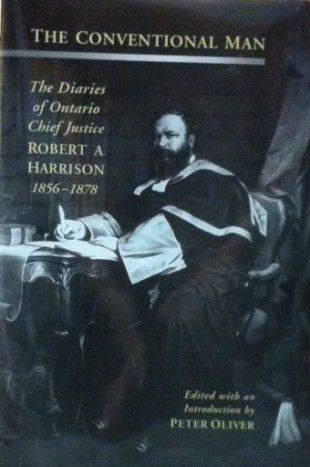edited with an introduction by Peter N. Oliver, Professor of History, York University. Published with the University of Toronto Press, 2003.
Between 1856 and 1878, the year of his death, Robert A. Harrison, a Toronto lawyer, often described as the outstanding common law lawyer of his generation in Canada and Chief Justice of Ontario in the late 1870’s, kept a diary.
The Harrison diary is one of the most remarkable documents bequeathed to us by the nineteenth century. In it Harrison provides detailed and intimate accounts of life and love among Toronto’s upper crust, accounts which resound with ambition, passion, jealousy and rage as his life proceeds through courtships, marriages, deaths and all the throes and challenges of routine existence among Toronto’s privileged classes. Not least important are the behind-the-scenes insights into hundreds of courtroom battles fought before judges sometimes described as ignorant and thick-headed and juries who frequently succumbed to Victorian prejudices of race, gender bias and religion.
Although unusual in his driving ambitions and his consuming need to accumulate a fortune, Robert Harrison remained in most respects thoroughly conventional and Victorian and his diary offers unrivaled insights into the voice of the mid-nineteenth century Toronto male: confident, conventional and smug.
In Robert Harrison’s private diaries, history is personal and alive. In an extended biographical introduction Peter Oliver provides an explanation and a critical assessment of one man’s extraordinary life in Victorian Toronto.


